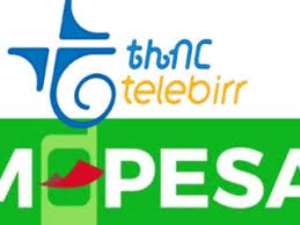 Ethiopian Banks Are Interconnected — Telebirr and M-Pesa Are Not which is Against National Bank Director .
Ethiopian Banks Are Interconnected — Telebirr and M-Pesa Are Not which is Against National Bank Director .Imagine you want to send money to your sister across town or receive payments for your small business. You have a phone, a national ID, and the will to participate in Ethiopia’s growing digital economy. But there’s a catch: if your phone’s SIM card is with Ethio-Telecom, you cannot open an M-Pesa wallet. If it’s Safaricom, Telebirr is off-limits. This is the daily reality for millions of Ethiopians.
For many people, mobile money is more than convenience—it’s survival. Farmers, traders, students, and teachers rely on digital wallets to pay bills, receive salaries, or send remittances. But when access depends on which SIM card you own, the system feels unfair and fragmented. People are forced to:
Switch SIM cards just to access different mobile wallets. Use clunky workarounds like sending money through banks. Miss out on opportunities because they can’t transact directly with others on different networks. This isn’t just inconvenient. It’s exclusion in the digital age.
Ethiopian banks, under the guidance of the National Bank of Ethiopia, have done something remarkable: they built an interconnected system. No matter which bank you use, you can send and receive money from any other bank’s customer. Your financial access doesn’t depend on loyalty to one bank. Why then do two of the country’s most popular mobile wallets operate as isolated islands?
M-Pesa and Telebirr grew out of telecom companies, and they still rely on telecom infrastructure—especially SIM registration—for customer verification (KYC). This linkage makes SIM ownership the gatekeeper to mobile money.
But this approach:
Limits who can open wallets. Forces users to juggle multiple SIMs or miss out entirely. Keeps wallets from talking directly to each other.
It’s time to rethink this model. Mobile wallets should be about people, not phones or networks. The technology and regulations exist for users to:
Open wallets with their national ID, regardless of SIM. Send money directly to anyone, regardless of their wallet provider. Enjoy simple, seamless transactions that work for their lives—not telecom contracts.
Ethiopia’s National Bank has paved the way with clear regulations promoting interoperability and inclusion. What remains is for mobile money providers to step up.
When mobile wallets behave as financial institutions rather than telecom services, users win:
Universal Access: Any Ethiopian with a valid ID can join the digital economy. Freedom to Choose: Users pick the best wallet or telecom without losing access. Greater Innovation: Open systems encourage new products and services. Financial Inclusion: More people can save, borrow, and transact safely.
This is not just good business—it’s good for the country.
M-Pesa and Telebirr have brought millions into the digital fold. But their true potential will only be realized when they break free from telecom boundaries and become full-fledged financial service providers. Ethiopian banks have shown what’s possible with interoperability and user-first design. Now it’s time for mobile wallets to follow.
Because in Ethiopia’s digital future, no one should be excluded because of their SIM card. Financial services must serve everyone—without exceptions.


